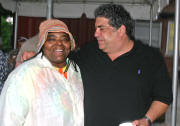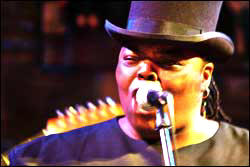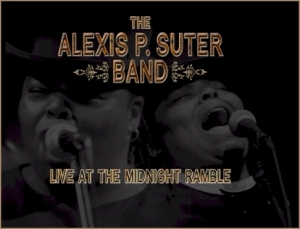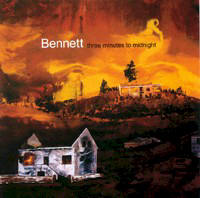Alexis P. Suter: This Midnight Rambler’s from Brooklyn
By Don Wilcock
Alexis P. Suter is a product of four different musical cultures. The 44-year-old was brought up in the church on gospel music. A native of Brooklyn, she became the first African American woman signed to Epic Sony Japan and had a number one dance hit in the ’90s called “Slam It, Baby.” She went on to work with the eclectic Hipbone label where she released a blues album called Suga Fix. Levon Helm discovered her at a benefit concert where they both performed and turned her into a regular at his Midnight Ramble jams in Woodstock where she warms up three generations of counter culture music lovers for the ex-Band drummers’ energized sets. Helm has released a combination CD and DVD The Alexis P. Suter Band Live at the Midnight Ramble on his own label.
Whether its gospel, dance, blues or Woodstock jams, the one consistent element in this woman’s repertoire, is the desire to keep it real. She’s very emotional, talks like a preacher in full sermonizing mode and creates music that is bigger than life.
Don Wilcock: When I watched you on your DVD Live at the Midnight Ramble and realized at the end of some of those songs I’m not even sure you’re ready to go on and do another song. You’re so taken up by your music.
Alexis P. Suter: I’m telling you, sometimes I’m in a total trance. A lot of people don’t understand that because I am really singing my life. If you knew the life I’ve had up till this point, I had a rough time when I was a kid. It had nothing to do with my parents. It was just that I was hot headed. And my music is what saved my life. When I’m singing to somebody, I get emotional when I talk to people. So, if I’m singing it and giving it all that I’ve got and I’m trying to relay to people, “This is who I am. This is what I did, what I’ve done. This is what I do.” I mean, it’s an emotional and spiritual feeling for me. It really is, and this music has saved my life. My church has saved my life.
DW:
Your record label Hipbone is built on the Stax-Volt theme. That
is it’s a bunch of people that all work together in an ensemble
situation.
APS:
Yes, yes.
DW:
How did it develop and what is your role in it?
APS:
Vicki (Bell) and her husband Ray (Grappone) and the Bennett
brothers (Peter and Jimmy), myself, we are definitely the type
of family that they say the family that prays together stays
together? We’re the family that plays together and stays
together. We collaborate and sometimes we bump heads, but we’ve
learned how to disagree, to agree to disagree. And in the end
when the smoke clears, we’ve come up with something beautiful,
something that at least to us is beautiful. It’s something with
meaning because these bands, we’re family. The Bennett brothers
and Ray have been together for 30 years before I ever came on
the scene. It’s just a magical thing we have together, and we
try to keep it on a level where it’s really part of each and
every one of us, and it’s real. It’s nothing that we’re making
up as fantasy or something that we wish could be, but a lot of
things we write about and sing about is really true to life. We
try to grab a little bit of each one of our lives and put it on
the paper, and relay it to the masses if we can.
DW:
You worked in the dance music field before you got into blues.
Tell me a little about that.
APS:
House music is just another name for dance music that was
another name for disco, and I had a number one underground
record called “Slam Me, Baby.”
DW:
When you say “underground,” underground to me means ’60s.
APS:
Well, in this respect, dance music was almost like the
Underground Railroad in my interpretation. It’s a type of music
where people get together. They put baby powder on the floor and
slip and slide and dance and twirl and the type of music is like
a lot of bass and drums. It’s very repetitious type of music.
You can say one sentence through the whole song. It’s a song.
And people are dancing and flipping and that’s really what
underground is. It’s just a certain type of music that wasn’t
too mainstream. It’s almost like the rave parties, and through
that in the ’90s I became the first African American woman to be
signed to Epic Sony Japan, and I did an EP with them called The
Dreams of Freedom on the first ever dance label on Sony. From
there, I took a real long hiatus because the manager I had at
the time took everything I had, all the money. He’s living on
Long Island right now in a 10-bedroom mansion, dah, dah, dah,
dah. That’s my money, but you know what? No luck will come to
him because he’s having health problems. His kids are having
health problems, and it’s sad to say that, but the kids are
paying for the sins of the father, and I believe God – see,
that’s why I don’t play with God because I know what He can do,
and I know what He will do, and that’s just my belief.
I left
that chapter alone in my life. I was on hiatus for a little
while. That’s how I met Vicki and Ray. Me and Vicki had done a
couple of things before I even got on their label. We did a
couple of background things together for a mutual friend, and we
missed our calling then, but then it came together. We were
meant to work with each other, and after that a few years later
I did a house music song with Vicki, and I think I did two or
three, and then Vicki and them was like, “You know What? We
should be doing blues.” I said, “We have to re-invent ourselves
because in the dance music scene, people love the music, but
they don’t want to buy it. They want to get high and dance. The
deejays are the only ones that exchange the music. They’re the
only ones getting paid from our talent. So, I said, “Look, we’ve
got to re-invent. We’ve got to do something because we have to
pay the bills.” So, we started doing blues and soul, and it’s
been a beautiful thing ever since. We’re still at the beginning
stages.
DW:
You’ve told me the music has to be real. Was that aspect in the
dance music, too?
APS:
The dance music scene is like this. To me, whatever I do I try
to do it as real, but for certain songs it’s totally different.
It’s like apples and oranges. Like with the blues thing, you can
be so so intimate with it and so real with it. In dance music,
they don’t want hear that.
DW:
That’s what I thought.
APS:
No, they don’t want to hear that. They want to hear about
jumping up and down, hanging off the chandeliers. They’re not
into the real thing. I mean, first of all, they’re so inebriated
and so high. A lot of them are. All they’re into is (She snaps
her fingers) the bass – boom – boom – boom. That’s all they’re
into. People in the blues, people in R&B, people in gospel, they
listen to what you’re saying, and they’re listening to what you
say because a lot of times people in these genres of music are
going through so much stuff emotionally and physically that when
you’re singing about things, certain things, they’re sitting
there listening and trying to cipher what you’re saying or
relate to what you’re saying. People in house music, they’re not
into all that. That’s why I love the blues because I can be as
real as real. I mean, I can be as real as I can be, and people
understand. They get it.
DW:
Did you know before you went in how intense this was going to
be, or did it gradually come to you?
APS:
I had no idea, none, because my only experience was with dance
music and how that crowd was, and gospel music. I was well
received in church because, you know. Come on! I grew up in the
church. I knew everybody. Of course, they’re going, “Yeah,
Alexis. God is good dah, dah, dah,” but the dance music thing
was totally a bummer to me except working with Hipbone Records
we really put our heart and soul into it, but I never knew the
blues would have that type of effect. I had no idea. I’m still
very young at this. I’ve only been doing the blues for five or
six years, now.
DW:
How did you meet Levon Helm?
APS:
Wow! We did a benefit at this school in Bay Ridge for a
gentleman by the name of Henry who is battling throat cancer,
and I believe Levon opened the set.
DW:
Was that because he’d had throat cancer and was sympathetic?
APS:
I don’t know what that situation was because I just met him that
night. I do know that before I sang on stage, his daughter, Amy,
Vicki Bell and myself got in the limousine with him to practice
because it was so congested inside. We couldn’t go over the
lyrics, and I remember the song “Hard Times” me and Amy
practicing, and Levon heard me sing. I didn’t really think he
paid it any mind because the man has been around the most
wonderful singers in the world.
So,
when we went back inside and did the set, we got through it.
Then, after that, he invited us up to a ramble, but it’s a
strange story. Before we went on stage, my guitar player Jimmy
Bennett had left some cords or some wires he needed for his
guitar. So, we all got in the limousine, and we rode somewhere
in Bay Ridge where he got out to get it. Then, his brother got
out and said, “Look, I gotta use the bathroom.” Then, Amy got
out and said, “I have to use the bathroom.” Then, Vicki went
with her. So, that left me and Levon in the limousine alone, and
it got a little awkward because he got a little quiet. I got
quiet. I said (to myself), “Alexis, say something. He’s like an
icon. He’s a wonderful spirit.” So, I said, “Levon, how was it
to be filming the movie,” and I made conversation with him.
That’s what real people do, and from that point we’ve just been
received so well by him, and he’s like our mentor. To me, he’s
mother, father, sister, brother because he’s so many things to
so many people.
Levon is the best spirit, the best energy, the best person. He is so genuine. This man has overcome throat cancer. God has blessed him because he is a great soul, and he treats people accordingly. He doesn’t treat anyone bad. He can rarely say no to anybody. I swear to everything I love that I will never let anyone speak bad about him. I will never let anyone treat him bad because he’s almost like God to me. I am not lying to you. People tell me, “You should be careful when you say that.” I’m not going to be careful when I say that.
Talking about him is almost like talking about God, man. (Choking up). He is the sweetest man. (Her voice cracks.) I know there are so many other people that are deserving of this, but he is such a great, great person. I don’t even know what to say. (At this point, Alexis is openly crying.) I put him in the same category as my mother and my father. Period! He is the sweetest man. Him and my mother, they talk sometimes. He loves my mother, and my mother loves Levon. I mean, I can’t even talk about the man without getting choked up because he’s done so much for me.
DW: Describe the Midnight Rambles because the buzz is just enormous in upstate New York about The Rambles.
APS: Wow! I think that a lot of people who have been very very big Band fans, they’re just delighted to see Levon. I mean, people who’d read the book This Wheel’s on Fire, they’ve seen of course “The Last Waltz.” I mean, we’re looking at people who were into Levon when they were basically teenagers and young adults. We have people come up there that are so much older that have been into Levon for many years, and they’re bringing their kids and grandkids. We’ve got little babies up there singing word for word “The Weight.” We’re talking about two and three-year-old kids singing “The Weight,” singing different songs that he does. It’s unbelievable. Oh, wow! I’m getting excited. I mean, the people, if you could just see their faces when he walks out. People are literally crying tears, man. They’re like, “Oh, my God! You don’t know. Me and my wife were at the filming of “The Last Waltz,” and I asked her to marry me, and we’re still together, and here we are again watching.” It’s just unbelievable.
I mean the energy is so high. I try to get the crowd warmed up for Levon. By the times he hits, it’s all over, baby. Him and his band.
DW:
You get into this.
APS:
Yeah, man.
DW: As
a 44-year-old African American woman do you find it strange that
there aren’t more African Americans into the blues?
APS:
When I’m singing this music, I’m singing it for all mankind.
DW: I
hear you.
APS: I
mean black, white, Chinese, Chicano, whatever.
DW:
That’s what your song “Plain Folks” is about.
APS: Absolutely. Absolutely! It’s like, come on, guys. Let’s get it together. Let’sdo this. And like I said, when I look out in the audience, and I don’t see a lot of people from my culture, it saddens me because I know that we’ve contributed so much to this genre of music as well as other music, but the blues, the swamp music, the backwoods, I don’t understand. This music has come from slavery when they were beating drums to relay messages. That was the blues, baby. That was the blues. We’re gonna meet by the river. Harriet Tubman is coming. Education is definitely the key. See, I don’t know what happened. I can’t speak for everybody.
DW: At the Pocono Festival you have a great position on the bill, the middle act on Friday night in the tent.
APS: And we really appreciate it. Believe me when I tell you, we are so humble to all that’s going on with us right now. Like I tell my band, I got my band into praying. Before each gig, I grab ’em and say, “Come, y’all. I’m gonna do a quick prayer before we go out there because this is what we need to cover us.” Where I come from, they call it the blood of the lamb or the blood of Jesus. When I pray or when we pray, it covers us. It protects us, and it gives us the energy we need to go out there and relate to the masses who we are and what we are, and this is what we do. We are blessed for it ’cause I have six Sicilians in my band and Irish boys. I’m just trying to give us some foundation in that area.






